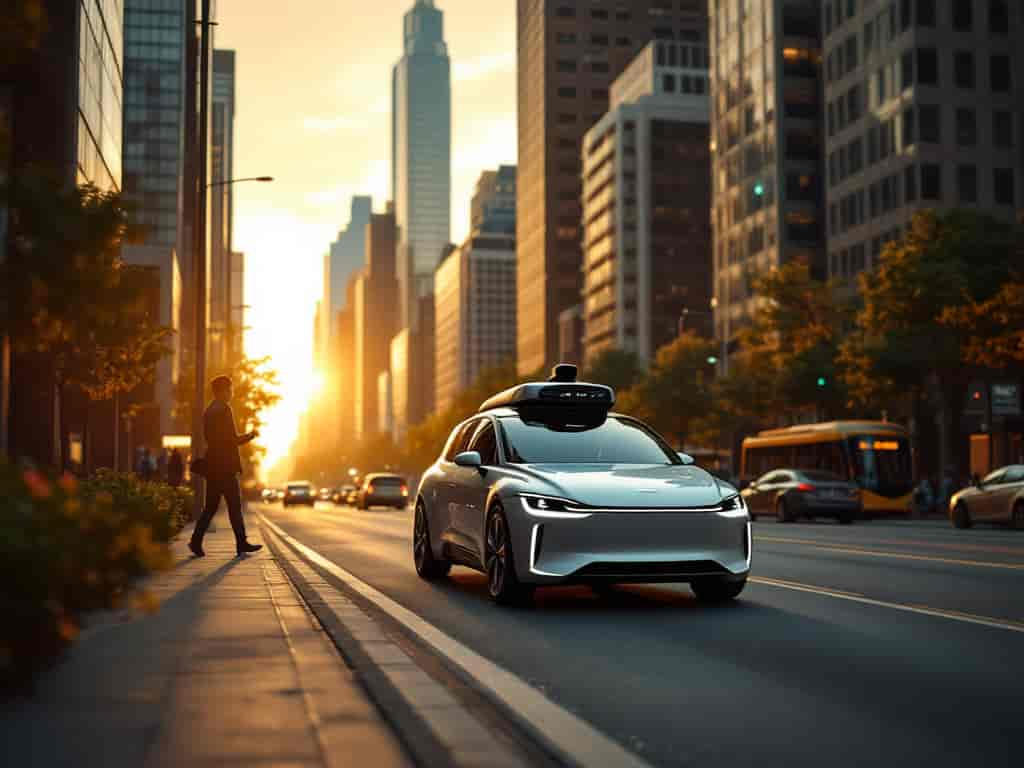How Self-Driving Cars Are Redefining Daily Commutes
Ellie Moore

Photo: How Self-Driving Cars Are Redefining Daily Commutes
How Self-Driving Cars Are Redefining Daily Commutes
The way we navigate our daily lives is undergoing a revolutionary transformation, thanks to the advent of self-driving cars. Autonomous vehicles are no longer a concept confined to science fiction they are actively reshaping the landscape of daily commutes. This article delves into how self-driving cars are redefining our everyday journeys, exploring their impact on efficiency, safety, sustainability, and urban living.
The Evolution of Self-Driving Cars
From Concept to Reality
The journey of self-driving cars from imaginative concepts to tangible reality has been swift and remarkable. Initially depicted in movies and literature, autonomous vehicles are now being tested and deployed on public roads worldwide. Companies like Tesla, Waymo, and Uber have spearheaded this movement, investing billions into research and development to bring driverless technology to the mainstream.
Key Technologies Behind Autonomous Vehicles
Self-driving cars rely on a suite of advanced technologies to operate seamlessly:
- Artificial Intelligence (AI) and Machine Learning: These enable vehicles to learn from vast amounts of data, improving their decision-making capabilities over time.
- Sensors and Cameras: LiDAR, radar, and high-definition cameras provide a 360-degree view of the vehicle’s surroundings, essential for navigation and obstacle detection.
- Connectivity: Vehicle-to-Everything (V2X) communication allows cars to interact with infrastructure, other vehicles, and even pedestrians, enhancing situational awareness.
- Advanced Navigation Systems: GPS and real-time mapping technologies ensure precise navigation and route optimization.
Transforming Daily Commutes
Increased Efficiency and Productivity
One of the most significant benefits of self-driving cars is the potential for increased efficiency in daily commutes. Autonomous vehicles can optimize routes in real-time, reducing travel time and avoiding traffic congestion. This efficiency translates into:
- Time Savings: Commuters can reach their destinations faster, making better use of their time.
- Productivity Boost: With the car handling driving tasks, passengers can engage in work, read, or relax, turning commute time into productive or restful periods.
Enhanced Safety and Reduced Accidents
Safety is a paramount concern in transportation, and self-driving cars promise substantial improvements:
- Reduced Human Error: Autonomous vehicles eliminate risks associated with distracted or impaired driving.
- Advanced Safety Features: Real-time monitoring and rapid response systems can prevent accidents before they occur.
- Consistent Compliance: Self-driving cars adhere strictly to traffic laws and regulations, minimizing the likelihood of violations.
According to the National Highway Traffic Safety Administration (NHTSA), over 90% of traffic accidents are due to human error. Autonomous vehicles aim to drastically reduce this statistic, making roads safer for everyone.
Environmental Benefits and Sustainability
Self-driving cars also contribute to environmental sustainability:
- Optimized Driving Patterns: Efficient acceleration and braking reduce fuel consumption and emissions.
- Electric Autonomous Vehicles: Many self-driving cars are electric, further decreasing the carbon footprint.
- Shared Mobility: Autonomous ride-sharing services can reduce the number of vehicles on the road, alleviating traffic congestion and lowering overall emissions.
Practical Implications for Commuters
Cost Savings and Economic Impact
Adopting self-driving cars can lead to significant cost savings for commuters:
- Lower Transportation Costs: Reduced need for personal vehicle ownership and maintenance expenses.
- Fuel Efficiency: Optimized driving reduces fuel consumption, saving money on energy costs.
- Insurance Benefits: Enhanced safety features may lead to lower insurance premiums.
On a broader scale, the economic impact includes job creation in technology and infrastructure sectors, while traditional driving-related jobs may evolve or diminish.
Accessibility and Mobility for All
Self-driving cars have the potential to enhance mobility for various demographics:
- Elderly and Disabled Individuals: Autonomous vehicles can provide independent transportation options, improving quality of life.
- Urban Residents: Increased mobility options without the need for personal car ownership, making transportation more accessible.
- Rural Communities: Enhanced connectivity and transportation options for remote areas, bridging gaps in mobility.
Changes in Urban Planning and Infrastructure
The rise of self-driving cars will influence urban development and infrastructure:
- Reduced Parking Needs: Autonomous vehicles can efficiently circulate or park themselves, freeing up urban space previously dedicated to parking lots.
- Smart Cities: Integration with smart infrastructure, such as traffic signals and public transportation systems, to create more efficient and responsive urban environments.
- Road Design: Future roads may be redesigned to accommodate autonomous vehicles, with dedicated lanes and improved signage for enhanced navigation.
Real-Life Examples and Case Studies
Waymo's Autonomous Commute Programs
Waymo, a leader in autonomous vehicle technology, has launched several pilot programs to test and refine their self-driving cars:
- Waymo One: A commercial ride-hailing service operating in select cities, providing passengers with fully autonomous rides.
- Autonomous Shuttles: Partnerships with cities to deploy self-driving shuttles for public transportation, improving connectivity and reducing congestion.
- Data-Driven Insights: Extensive data collection from real-world operations helps Waymo enhance vehicle performance and safety protocols.
Tesla's Self-Driving Innovations
Tesla has been at the forefront of integrating self-driving capabilities into consumer vehicles:
- Autopilot and Full Self-Driving (FSD) Features: Advanced driver-assistance systems that offer semi-autonomous driving capabilities, with ongoing updates aimed at achieving full autonomy.
- Over-the-Air Updates: Continuous improvement of self-driving algorithms and functionalities through remote software updates.
- Autonomous Fleet Data: Leveraging data from millions of miles driven by Tesla vehicles to train and refine their AI systems.
Challenges and Future Prospects
Regulatory and Ethical Considerations
The widespread adoption of self-driving cars faces several regulatory and ethical challenges:
- Legislation: Developing comprehensive laws and regulations to govern autonomous vehicle operations, liability, and safety standards.
- Ethical Dilemmas: Addressing moral decisions in unavoidable crash scenarios and ensuring equitable access to autonomous transportation.
- Privacy Concerns: Managing data collection and usage while protecting passenger privacy and security.
Technological Hurdles and Solutions
Despite significant advancements, self-driving cars must overcome ongoing technological challenges:
- Complex Environments: Navigating unpredictable and dynamic urban environments requires robust and adaptable AI systems.
- Sensor Reliability: Ensuring sensors function accurately in all weather conditions and scenarios.
- Cybersecurity: Protecting autonomous vehicles from hacking and cyber threats to maintain safety and trust.
Innovative solutions, such as enhanced AI algorithms, improved sensor technologies, and stringent cybersecurity measures, are being developed to address these hurdles.
Actionable Tips for Embracing Self-Driving Cars
Preparing for the Transition
As self-driving cars become more prevalent, commuters can take proactive steps to adapt:
- Stay Informed: Keep up with the latest developments in autonomous vehicle technology and regulations.
- Educate Yourself: Understand the functionalities and limitations of self-driving cars to make informed decisions.
- Upgrade Infrastructure: If you're a business owner or urban planner, invest in smart infrastructure to support autonomous vehicles.
Leveraging Technology for a Better Commute
Maximize the benefits of self-driving cars by integrating them with other technologies:
- Smart Home Integration: Sync your autonomous vehicle with home automation systems for seamless transitions between home and car.
- Productivity Tools: Utilize in-car entertainment and productivity features to make the most of your commute time.
- Eco-Friendly Practices: Choose electric autonomous vehicles to contribute to sustainability and reduce your carbon footprint.
Conclusion
Self-driving cars are not just a glimpse into the future they are actively transforming daily commutes today. By enhancing efficiency, safety, and sustainability, autonomous vehicles are reshaping how we travel, work, and live. As technology continues to advance and societal adoption grows, the way we perceive and engage with transportation will evolve dramatically. Embrace the change, stay informed, and be part of the revolution that is redefining our daily commutes.
Have you experienced the benefits of self-driving cars in your daily life? Share your thoughts and experiences in the comments below! Don't forget to share this article with others who are interested in the future of transportation. Explore more insightful articles on our blog to stay updated on the latest in automotive innovation.
Frequently Asked Questions (FAQ)
What are the main benefits of self-driving cars for daily commutes?
Self-driving cars offer increased efficiency by optimizing routes, enhanced safety through reduced human error, and environmental benefits by promoting fuel efficiency and reducing emissions. They also provide greater accessibility for individuals who may have limited mobility.
How safe are autonomous vehicles compared to traditional cars?
Autonomous vehicles have the potential to be significantly safer than traditional cars by eliminating human errors, adhering strictly to traffic laws, and utilizing advanced sensors and AI to respond to hazards promptly. However, ongoing advancements and rigorous testing are essential to achieve optimal safety standards.
When will self-driving cars become mainstream?
While self-driving technology has made substantial progress, mainstream adoption depends on various factors, including regulatory approvals, technological advancements, and public acceptance. Experts predict that fully autonomous vehicles could become widely available within the next decade.
What challenges do self-driving cars face in urban environments?
Navigating complex and unpredictable urban environments poses challenges for self-driving cars, including handling diverse traffic scenarios, dealing with pedestrians, and managing varying weather conditions. Continuous improvements in AI and sensor technologies are addressing these issues.
How do self-driving cars impact the environment?
Self-driving cars contribute to environmental sustainability by optimizing driving patterns for better fuel efficiency, reducing emissions through electric vehicle integration, and potentially decreasing the number of vehicles on the road through shared mobility services.
Are there any ethical concerns associated with autonomous vehicles?
Yes, ethical concerns include decision-making in unavoidable crash scenarios, ensuring equitable access to autonomous transportation, and managing privacy related to data collection and usage. Addressing these concerns is crucial for the responsible deployment of self-driving cars.
Finance & Investment
View All
November 23, 2024
How to Start a Side Hustle to Boost Your Monthly IncomeBoost your monthly income with a side hustle! Discover creative ways to earn extra cash, from freelancing to online businesses. Learn how to turn your skills into profits. Start today!
Ellie Moore

May 1, 2025
Makwa Finance Loan ReviewsUnlock top Google rankings & build authority with expert SEO content. Discover how deep knowledge, value, and E-E-A-T drive your digital success.
Ellie Moore

February 6, 2025
Benefits of Market Segmentation for StartupsUncover the benefits of market segmentation for startups. Learn how it helps identify opportunities and achieve rapid growth.
Ellie Moore

October 18, 2025
Find In House Financing Near MeMaster expert SEO content to rank higher & engage readers. Learn user intent, E-E-A-T, and strategies to build authority & trust.
Ellie Moore

March 23, 2025
Find Your Risk Tolerance: What Kind of Investor?Discover what risk tolerance means and how it affects your investment decisions. Uncover your investor profile and make smarter financial choices today!
Ellie Moore

January 24, 2025
NYS Finance and Taxation BasicsBeyond keywords: Craft expert SEO content that ranks high, builds E-E-A-T, and genuinely helps your audience. Future-proof your strategy.
Ellie Moore
Insurance
View AllConcerned about rising auto costs? Discover how to get premium auto insurance quotes for optimal coverage, maximum savings, and financial peace of mind.
Ellie Moore
Protect your small business from cyber threats with essential cyber insurance. Learn why it’s critical in today’s digital age.
Ellie Moore
Discover how lifestyle changes, like quitting smoking or driving less, can unlock insurance discounts. Start saving now!
Ellie Moore
Discover how insurance policies have evolved over time to meet changing needs, from early models to modern-day coverage.
Ellie Moore
Navigate car insurance with confidence. This guide helps policyholders & risk managers find top-rated agents for optimal coverage, best value, and peace of mind...
Ellie Moore
Explore aviation insurance options, from aircraft liability to passenger protection. Secure the skies for your operations!
Ellie Moore
Education
View AllHelp students master metacognition! Learn how teaching students to think about their thinking can improve problem-solving and critical thinking skills.
Read MoreHow does social media affect learning and behavior? Uncover the positive and negative effects of social platforms on students today.
Read MoreThe digital divide limits education access. Explore strategies and initiatives to bridge this gap and ensure global learning equality.
Read MoreOpen educational resources are breaking down barriers to knowledge. Learn how free learning materials are changing the global education scene.
Read MoreDiscover how assistive technology empowers special needs learners. Learn about tools that foster inclusivity and enhance educational outcomes.
Read MoreSudbury schools embrace radical self-direction in learning. Learn how they empower students to take full control of their education journey.
Read MorePopular Post 🔥
View All
1
2
3
4
5
6
7
8
9
10
Health






Automotive
View All
September 3, 2025
Which Automotive Paint Gun Works Best For You
Unlock flawless car paint jobs! This guide helps you choose the best automotive paint gun for stunning results, efficiency, and control. Perfect for DIYers & pr...

August 30, 2025
Thornton Automotive Experts In Your Area
Find trusted auto repair in Thornton! Learn what defines top-tier automotive experts, from local knowledge to certifications, for peace of mind on the road.

July 13, 2025
Driven Automotive Success Stories You Should Know
Explore compelling automotive success stories! Learn how Ford, GM, and others overcame challenges with resilience and innovation to redefine mobility.

February 4, 2025
Tire Care Guide: Boost Tire Life & Performance
Maximize tire life with essential tire care tips! Learn how proper maintenance improves performance and ensures safety on every drive.

August 22, 2025
Dannys Automotive Fast Reliable Service
Danny's Automotive offers fast, reliable service. Get expert vehicle care combining speed with precision and trust, without compromising your schedule.

July 29, 2025
Step One Automotive Services To Know About
Your essential guide to vehicle care. Learn proactive automotive services for safety, extended car life, fuel efficiency & long-term savings.

















